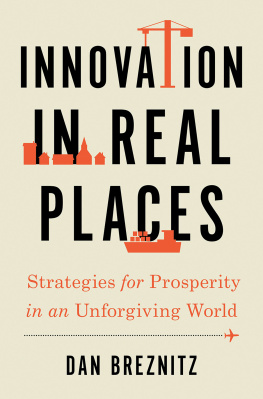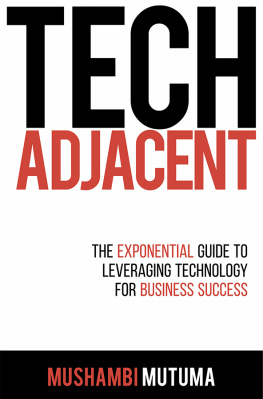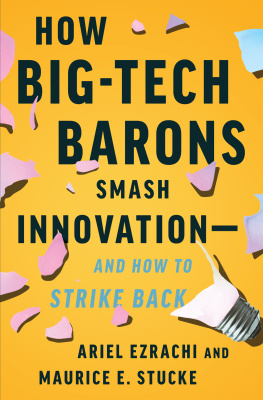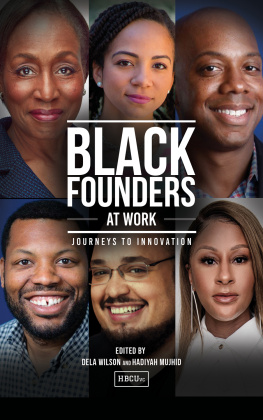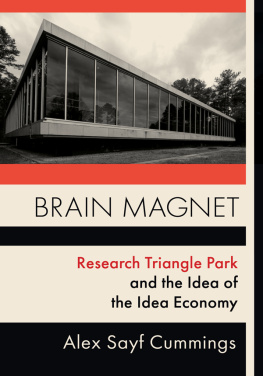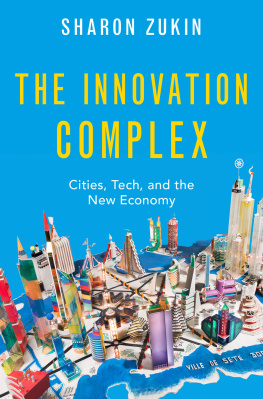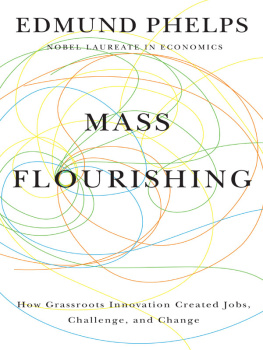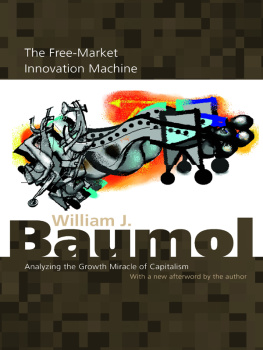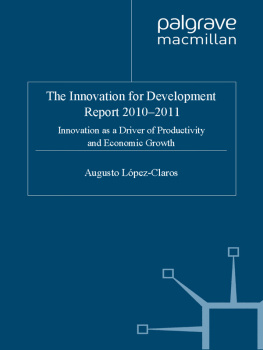Innovation in Real Places

Oxford University Press is a department of the University of Oxford. It furthers the Universitys objective of excellence in research, scholarship, and education by publishing worldwide. Oxford is a registered trade mark of Oxford University Press in the UK and certain other countries.
Published in the United States of America by Oxford University Press
198 Madison Avenue, New York, NY 10016, United States of America.
Oxford University Press 2021
All rights reserved. No part of this publication may be reproduced, stored in a retrieval system, or transmitted, in any form or by any means, without the prior permission in writing of Oxford University Press, or as expressly permitted by law, by license, or under terms agreed with the appropriate reproduction rights organization. Inquiries concerning reproduction outside the scope of the above should be sent to the Rights Department, Oxford University Press, at the address above.
You must not circulate this work in any other form and you must impose this same condition on any acquirer.
Library of Congress Cataloging-in-Publication Data
Names: Breznitz, Dan, author.
Title: Innovation in real places : strategies for prosperity in an
unforgiving world / Dan Breznitz.
Description: New York, NY : Oxford University Press, [2021] |
Includes bibliographical references and index. |
Identifiers: LCCN 2020050294 (print) | LCCN 2020050295 (ebook) |
ISBN 9780197508114 (hardback) | ISBN 9780197508138 (epub) |
ISBN 9780197508145
Subjects: LCSH: Technological innovationsEconomic aspects. |
Technological innovationsGovernment policy. |
Industrial capacityEconomic aspects. | Industrial policy. |
Community development. | Economic development. | Globalization.
Classification: LCC HC79.T4 B695 2021 (print) | LCC HC79.T4 (ebook) |
DDC 338.9dc23
LC record available at https://lccn.loc.gov/2020050294
LC ebook record available at https://lccn.loc.gov/2020050295
DOI: 10.1093/oso/9780197508114.001.0001
To Shiri: two kids, three decades, four continents, and I still dream of you.
Contents
This book took me the longest to write, by far. This experience also taught me a very valuable lesson: it is one thing to conduct research and write it for scientists, and a completely different task to explain what it means to daily life. As a result, I developed a whole new appreciation for scholars who not only try to think about the implications of their research, but also go on to write about them in a way everyone can relate to.
This book is also a diary of a very long journey of studying, researching, and being involved in the development of, and experimentation in, innovation policies. This was not a journey I took alone. Accordingly, this book could not have been written without the many friends who shared this road with me. Many a time they had to save me from getting lost; always, though, they shared with me insights and beautiful examples of human ingenuity I would have never known otherwise.
Standing tall among them are Amos Zehavi, who literally traveled with me over three continents and also shared the very painful experience of being PhD students together so many years ago that we both find it difficult to count them. Further, after all of that, he very patiently waited for me to (finally, with great delay) finish this book, so we can also finish our joint one. Michael Murphree, who started as my student, turned into an employee and then back to being my student, before transitioning into a partner in crime, all the while being an amazing friend. Without you I would have never gotten to know China and walked so many of its alleys. John Zysman, who for no apparent good reason took me under his wing at Berkeley when, as a young stressed-out freshly minted PhD, I spent a year in what he calls the Junior College on the peninsula. Since those early days of 2006, we have worked so closely together on so many projects that I lost count. Martin Kenney, with whom I have been constantly sharing ideas as they evolve and form in our minds. Darius Ornston, a friend, a colleague, and a shy genius, with whom I have been writing what I think are some of my best papers (the same ones he probably views as, at best, reasonable drafts). Zak Taylor, who, like Amos, should be thanked, if only because he still talks to me even after knowing me since we were all PhD students, but much more so for our valuable and constant brainstorming, and the fact that he somehow kept me sane in Atlanta. Aldo Geuna, for friendship, arranging the opportunity to spend first a year and then many more months throughout the years in Turin, and many intellectual endeavors since. Giulio Buciuni, for showing me the amazing stories of innovation in northeastern Italy, and for far too many craft beers (yes Giulio, unlike coffee, red wine, whiskey, and Armagnac, there is such a thing as too many beers). Gilles Rabin has opened my eyes to the many facets of innovation in France and Europe, giving me companionship along the road. Thanks to you, my friend, I now go and explore the main public transportation terminals in every city I visit around the world. In Finland, Petri Rouvinen gave me a crash course in Finnish innovation and economic policies, while introducing me to everyone, everywhere. Serving with you on the committee to evaluate the Finnish Innovation System was one of the most valued educational and public service experiences of my life. More importantly, however, was your help in fulfilling my childhood dream, and hooking my children up to the best stories in the worldthe Moomins.
In the fair city of Atlanta, Georgia Tech has been a wonderful home for eight years, shaping me as a scholar and letting me wonder wider and wilder than many other universities would allow young assistant professors. I will forever be grateful to William Long and Diana Hicks for their instrumental role in bringing me there, and the many friends in the Sam Nunn School and the School of Public Policy who made it a home for the first five years. Special thanks are owed to Kirk Bowman, who taught me how to think outside the box. Im looking forward to many more opportunities to do so together in all of the Americas, and to Brian Woodall, Sy Goodman, Adam Stulberg, and Michael Best for making us feel at home and making the Sam Nunn School such an interesting place to be. Doug Noonan, Hans Klein, John Walsh, Phil Shapira (in both Atlanta and Manchester, UK), Aaron Levine, and last, out-smiling them all, Paul Baker did the same in the School of Public Policy, demonstrating that friendly intellectual competition does wonders for everybody involved.
Jerry and Marie Thursby hold a special place of honor, together with the strategy group they built and ran at the Scheller College of Business at Georgia Tech. The intellectual vibrancy and camaraderie I enjoyed during my three years there were second to none. I still miss our weekly seminars. If you ever get bored with retirement, you are always welcome to come to Toronto for a week, a month, or a few years. In the strategy groups, having daily discussions with Matt Higgins, Alex Oettl, Marco Ceccagnoli, and Annamaria Conti defiantly shaped my thinking. Just as important were the interactions with PhD students in all three schools, especially Vincenzo Palermo. Stu Graham should be thanked for giving me his office while he was seconded as the very first Chief Economist of the US Patent Office. Last, but certainly not least, having Chris Forman around the corner to work with was an immense pleasure, which continues even after we both moved North.

